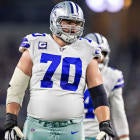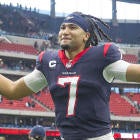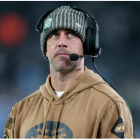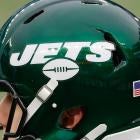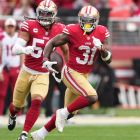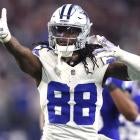The playoffs have not been kind to hotshot offensive coordinators. The play callers on that side of the ball, who were being courted for head coaching vacancies, simply did not fare favorably.
In some cases, it was downright ugly.
It's always a tricky proposition, juggling the weight of having to navigate an offense – and in some of these cases, a very young quarterback – through the biggest game of the season (and in many cases, of their career), while knowing that the entire league is watching intently, including the outside ownership groups you are trying to impress for their opening. Might you want to strut your stuff a little and show your prospective new owner all the cool stuff you can do in the passing game to maybe try to catch his eye? Can't help but wonder.
The stakes were even higher in 2020, with so few head coaching jobs open and the path for offensive coordinators already limited given that two long-time NFL coaches were hired almost on the spot (Ron Rivera in Washington and Mike McCarthy in Dallas), then Carolina did the same for a college coach (Matt Rhule) and the Giants immediately followed by snagging a special teams coach (Joe Judge), leaving only the Browns to potentially hire an offensive play-caller/QB guru.
The fact that the coordinator who had the worst day of any of them – Kevin Stefanski, whose Vikings mustered as many offensive first-downs gained (6) as punts – is the guy who actually got the job, may tell you all you need to know about how much any single-game playoff performance probably alters the hiring process. But with owners, especially those as unpredictable and impatient as Cleveland's, you never know, and human nature would indicate that some fickle billionaires might blink from hiring their guy if he does author a total stinker with his season on the line.
Human nature would also dictate that this juxtaposition of present duty/future job would be inescapable for the coaches themselves. Young coaches, by and large, who are still up for the biggest promotion of their lives -- one that would bring generational wealth and perhaps alter the scope of their professional lives in a way that almost no other proposition could -- have a tough enough task having to face some of the best defenses still playing in the NFL. They have enough to sort through, already. The scope of a possible head coaching job only ratchets the pressure even higher.
There is no way it would not be on your mind, at least subconsciously. Sure, the adrenaline rush once the game starts would take over, I imagine and players are being injured and some plays are having to be chucked and the lingering Browns head coaching opening wouldn't exactly be at the fore of one's thoughts. But it's there, somewhere. Hearing about it all week and being asked by friends and family about where things stood and the constant barrage of NFL coaching news and rumors and, well, in some cases, half-truths at best, is ever-present.
They are the cusp of a life-changing event. You can't tell me there is a switch that makes that go away game day. And it tends not to bring out the best in candidates over the years, it seems to me anecdotally, though admittedly I haven't done a deep statistical dive. None of my colleagues at THE NFL TODAY disagreed with my premise as we watched the postseason together and the results were, overall, quite poor.
A summary, in chronological order:
Brian Daboll, Bills offensive coordinator, 22-19 (OT) Wild Card loss
His future is beyond bright and this was just his initial foray into the head coaching circuit. Did wonders with Josh Allen all season, was a maestro in the first half getting the Bills to a 16-0 lead at Houston. Then things fell apart (and Allen melted down). Buffalo ran 35 plays on its final five drives for a grand total of 96 net yards (2.74 per play). On a day in which they averaged a staggering 5.7 yards per rush (172 yards), and did not trail until very late, they ended up attempting 48 passes, while averaging a paltry 5.0 yards per passing play (nearly a yard less than each run attempt). In hindsight running more clock may have been the way to go. All things considered, Daboll is doing great work with Allen, who came into the league with serious accuracy and decision-making issues.
Josh McDaniels, Patriots offensive coordinator, 20-13 Wild Card loss
Of all these men, he has been through this so many times before. The interviewing and coaching all the while waiting for a signal from some owner is an annual rite of January for him by now. And New England's offense has been undermined by a lack of talent and injuries all season, so you'd have to be silly to expect the postseason to be much different. There are only so many trick plays one can run. But in the end, 307 total yards and one touchdown, without a single play of 30 yards, while bowing out to a six seed in Foxboro isn't what you think of when Tom Brady, even at age 43, comes to mind. Especially when it may have been his final game ever as a Patriot.
Greg Roman, Ravens offensive coordinator, 28-12 Divisional Round loss
His work with Lamar Jackson helped fuel an MVP season and 14-2 record. Roman was a master almost every week of the regular season. And yes, Jackson rolled up over 500 combined yards against the Titans, too. But he did so much of it on his own, with Roman abandoning the identity that fueled their historic season despite it being a one-score game deep into the third quarter. Sure, having guys like blocking tight end Nick Boyle and pass-catching tight end Mark Andrews and lead back Mark Ingram in and out of the game with injuries made life difficult. But for a team that mauled people out of heavy packages all season, there was no excuse to quickly bail on the RPO/mesh point game and simply give up on stud fullback Patrick Ricard (7 snaps out of 92) and running back Gus Edwards, who gashed the Titans early but didn't even play 20 percent of the snaps. The Ravens top two running backs had 10 total touches and this team set the single-season team rushing mark in 2019 – and Roman never went to the screen game much. Jackson dropped back 70 times(!), with Roman leaning hard on an empty set look at critical times in the game that was totally out of character for this offense. Roman has just one WR he can count on, and yet he decided to spread things out. They got burned repeatedly on 4th and short, and Jackson was too amped up early and made a few mistakes (he just turned 23), but he also made about 10 ridiculous throws and was undermined by consistent drops and poor in-game decisions by his coordinator for the second straight postseason.
Kevin Stefanski, Vikings offensive coordinator, 27-10 Divisional Round loss
He did a really nice job in the Wild Card upset of the Saints, with the Vikings controlling the line of scrimmage on both sides of the ball. That wasn't going to be the case in San Francisco, against the best defense in the NFL, and Stefanski's showdown with 49ers defensive coordinator Robert Saleh, the other eventual finalist for the Browns job, was a total beatdown. Minnesota, somehow, went 2 of 14 on third and fourth down and managed all of 147 total yards in a playoff game. They averaged 3.3 yards per attempt and Kirk Cousins managed to complete 21 of 29 passes for all of 126 net yards. That's almost impossible. They couldn't even pretend to run the ball or pad their passing stats in garbage time (which amounted to basically the entire half). San Fran coach Kyle Shanahan took the air out of the ball after Jimmy G threw a bad pick and dared the Vikings to move the ball on his defense the rest of the game. The Vikings had no answers whatsoever. They barely held the ball for 20 minutes. It was hard to watch.
None of this means these four, or at least one of them, won't be a solid head coach. Everyone has a tough day at the office and in many of these cases, their players got whipped by the opposition, too, and made key mistakes. But it's a dynamic worth tracking moving forward, and I can certainly understand how it might play with one's mind. Certainly seemed to during the 2020 playoffs.











